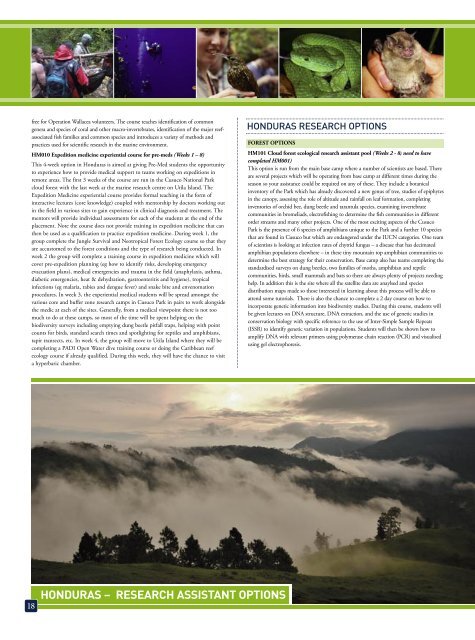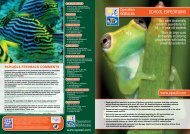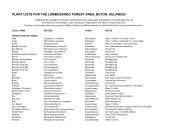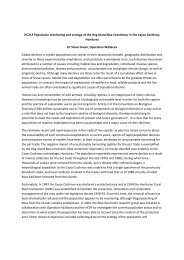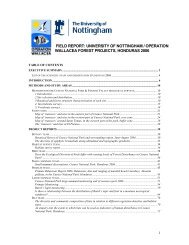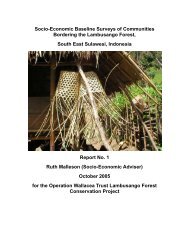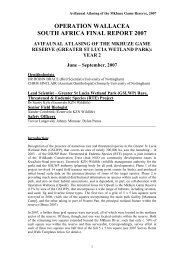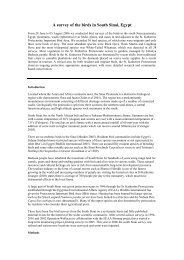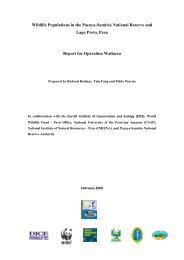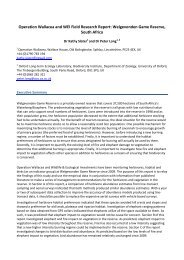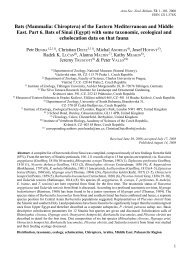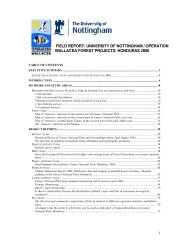Download the 2013 programme - Operation Wallacea
Download the 2013 programme - Operation Wallacea
Download the 2013 programme - Operation Wallacea
You also want an ePaper? Increase the reach of your titles
YUMPU automatically turns print PDFs into web optimized ePapers that Google loves.
free for <strong>Operation</strong> <strong>Wallacea</strong> volunteers. The course teaches identification of common<br />
genera and species of coral and o<strong>the</strong>r macro-invertebrates, identification of <strong>the</strong> major reefassociated<br />
fish families and common species and introduces a variety of methods and<br />
practices used for scientific research in <strong>the</strong> marine environment.<br />
HM010 Expedition medicine experiential course for pre-meds (Weeks 1 – 8)<br />
This 4-week option in Honduras is aimed at giving Pre-Med students <strong>the</strong> opportunity<br />
to experience how to provide medical support to teams working on expeditions in<br />
remote areas. The first 3 weeks of <strong>the</strong> course are run in <strong>the</strong> Cusuco National Park<br />
cloud forest with <strong>the</strong> last week at <strong>the</strong> marine research centre on Utila Island. The<br />
Expedition Medicine experiential course provides formal teaching in <strong>the</strong> form of<br />
interactive lectures (core knowledge) coupled with mentorship by doctors working out<br />
in <strong>the</strong> field in various sites to gain experience in clinical diagnosis and treatment. The<br />
mentors will provide individual assessments for each of <strong>the</strong> students at <strong>the</strong> end of <strong>the</strong><br />
placement. Note <strong>the</strong> course does not provide training in expedition medicine that can<br />
<strong>the</strong>n be used as a qualification to practice expedition medicine. During week 1, <strong>the</strong><br />
group complete <strong>the</strong> Jungle Survival and Neotropical Forest Ecology course so that <strong>the</strong>y<br />
are accustomed to <strong>the</strong> forest conditions and <strong>the</strong> type of research being conducted. In<br />
week 2 <strong>the</strong> group will complete a training course in expedition medicine which will<br />
cover pre-expedition planning (eg how to identify risks, developing emergency<br />
evacuation plans), medical emergencies and trauma in <strong>the</strong> field (anaphylaxis, asthma,<br />
diabetic emergencies, heat & dehydration, gastroenteritis and hygiene), tropical<br />
infections (eg malaria, rabies and dengue fever) and snake bite and envenomation<br />
procedures. In week 3, <strong>the</strong> experiential medical students will be spread amongst <strong>the</strong><br />
various core and buffer zone research camps in Cusuco Park in pairs to work alongside<br />
<strong>the</strong> medic at each of <strong>the</strong> sites. Generally, from a medical viewpoint <strong>the</strong>re is not too<br />
much to do at <strong>the</strong>se camps, so most of <strong>the</strong> time will be spent helping on <strong>the</strong><br />
biodiversity surveys including emptying dung beetle pitfall traps, helping with point<br />
counts for birds, standard search times and spotlighting for reptiles and amphibians,<br />
tapir transects, etc. In week 4, <strong>the</strong> group will move to Utila Island where <strong>the</strong>y will be<br />
completing a PADI Open Water dive training course or doing <strong>the</strong> Caribbean reef<br />
ecology course if already qualified. During this week, <strong>the</strong>y will have <strong>the</strong> chance to visit<br />
a hyperbaric chamber.<br />
18<br />
HONDURAS – RESEARCH ASSISTANT OPTIONS<br />
HONDURAS RESEARCH OPTIONS<br />
FOREST OPTIONS<br />
HM101 Cloud forest ecological research assistant pool (Weeks 2 - 8; need to have<br />
completed HM001)<br />
This option is run from <strong>the</strong> main base camp where a number of scientists are based. There<br />
are several projects which will be operating from base camp at different times during <strong>the</strong><br />
season so your assistance could be required on any of <strong>the</strong>se. They include a botanical<br />
inventory of <strong>the</strong> Park which has already discovered a new genus of tree, studies of epiphytes<br />
in <strong>the</strong> canopy, assessing <strong>the</strong> role of altitude and rainfall on leaf formation, completing<br />
inventories of orchid bee, dung beetle and tarantula species, examining invertebrate<br />
communities in bromeliads, electrofishing to determine <strong>the</strong> fish communities in different<br />
order streams and many o<strong>the</strong>r projects. One of <strong>the</strong> most exciting aspects of <strong>the</strong> Cusuco<br />
Park is <strong>the</strong> presence of 6 species of amphibians unique to <strong>the</strong> Park and a fur<strong>the</strong>r 10 species<br />
that are found in Cusuco but which are endangered under <strong>the</strong> IUCN categories. One team<br />
of scientists is looking at infection rates of chytrid fungus – a disease that has decimated<br />
amphibian populations elsewhere – in <strong>the</strong>se tiny mountain top amphibian communities to<br />
determine <strong>the</strong> best strategy for <strong>the</strong>ir conservation. Base camp also has teams completing <strong>the</strong><br />
standardised surveys on dung beetles, two families of moths, amphibian and reptile<br />
communities, birds, small mammals and bats so <strong>the</strong>re are always plenty of projects needing<br />
help. In addition this is <strong>the</strong> site where all <strong>the</strong> satellite data are anaylsed and species<br />
distribution maps made so those interested in learning about this process will be able to<br />
attend some tutorials. There is also <strong>the</strong> chance to complete a 2 day course on how to<br />
incorporate genetic information into biodiversity studies. During this course, students will<br />
be given lectures on DNA structure, DNA extraction, and <strong>the</strong> use of genetic studies in<br />
conservation biology with specific reference to <strong>the</strong> use of Inter-Simple Sample Repeats<br />
(ISSR) to identify genetic variation in populations. Students will <strong>the</strong>n be shown how to<br />
amplify DNA with relevant primers using polymerase chain reaction (PCR) and visualised<br />
using gel electrophoresis.


